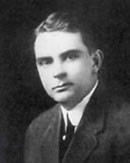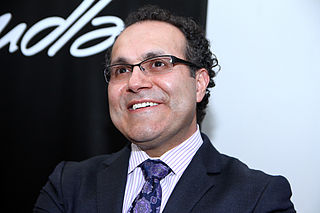
Neurosurgery or neurological surgery, known in common parlance as brain surgery, is the medical specialty concerned with the surgical treatment of disorders which affect any portion of the nervous system including the brain, spinal cord and peripheral nervous system.

Glioblastoma, previously known as glioblastoma multiforme (GBM), is the most aggressive and most common type of cancer that originates in the brain, and has very poor prognosis for survival. Initial signs and symptoms of glioblastoma are nonspecific. They may include headaches, personality changes, nausea, and symptoms similar to those of a stroke. Symptoms often worsen rapidly and may progress to unconsciousness.

Walter Edward Dandy was an American neurosurgeon and scientist. He is considered one of the founding fathers of neurosurgery, along with Victor Horsley (1857–1916) and Harvey Cushing (1869–1939). Dandy is credited with numerous neurosurgical discoveries and innovations, including the description of the circulation of cerebrospinal fluid in the brain, surgical treatment of hydrocephalus, the invention of air ventriculography and pneumoencephalography, the description of brain endoscopy, the establishment of the first intensive care unit, and the first clipping of an intracranial aneurysm, which marked the birth of cerebrovascular neurosurgery.
John R. Adler is an American neurosurgeon and medical device entrepreneur.

Alfredo Quiñones-Hinojosa is a Mexican-American neurosurgeon, author, and researcher. Currently, he is the William J. and Charles H. Mayo Professor and Chair of Neurologic Surgery and runs a basic science research lab at the Mayo Clinic Jacksonville in Florida.

Gail Linskey Rosseau is Clinical Professor of Neurosurgery at George Washington University School of Medicine and Health Sciences, Washington, D.C. Prior to this position, she was Associate Chairman of Inova Fairfax Hospital Department of Neurosciences. She previously served as director of skull base surgery of NorthShore University HealthSystem. She is board-certified and has been an examiner for the American Board of Neurological Surgery. She has been elected to the leadership of the American Association of Neurological Surgeons, World Federation of Neurosurgical Societies, and the Société de Neurochirurgie de Langue Française.
Neuro-oncology is the study of brain and spinal cord neoplasms, many of which are very dangerous and life-threatening. Among the malignant brain cancers, gliomas of the brainstem and pons, glioblastoma multiforme, and high-grade astrocytoma/oligodendroglioma are among the worst. In these cases, untreated survival usually amounts to only a few months, and survival with current radiation and chemotherapy treatments may extend that time from around a year to a year and a half, possibly two or more, depending on the patient's condition, immune function, treatments used, and the specific type of malignant brain neoplasm. Surgery may in some cases be curative, but, as a general rule, malignant brain cancers tend to regenerate and emerge from remission easily, especially highly malignant cases. In such cases, the goal is to excise as much of the mass and as much of the tumor margin as possible without endangering vital functions or other important cognitive abilities. The Journal of Neuro-Oncology is the longest continuously published journal in the field and serves as a leading reference to those practicing in the area of neuro-oncology.
Griffith Rutherford Harsh IV is an American neurosurgeon. In 2018, he became the chair of the department of neurological surgery at UC Davis Health.

Barrow Neurological Institute is the world's largest neurological disease treatment and research institution, and is consistently ranked as one of the best neurosurgical training centers in the United States. Founded in 1962, the main campus is located at 350 W. Thomas Road in Phoenix, Arizona.
Albert Loren Rhoton Jr., was an American neurosurgeon and a professor specializing in microsurgical neuroanatomy. He was on the editorial boards of six surgical journals, and worked as professor and chairman of the Department of Neurological Surgery at the University of Florida. He was also president of organizations such as the American Association of Neurological Surgeons, among other surgical organizations.

Michael L. J. Apuzzo is an American academic neurological surgeon, the Edwin M. Todd/Trent H. Wells, Jr. Professor Emeritus of Neurological Surgery and Radiation Oncology, Biology, and Physics at the Keck School of Medicine, of the University of Southern California. He is also editor emeritus of the peer-reviewed journals World Neurosurgery and Neurosurgery. He is distinguished adjunct professor of neurosurgery at the Yale School of Medicine, distinguished professor of advanced neurosurgery and neuroscience and senior advisor, at the Neurological Institute, Wexner Medical School, The Ohio State University, and adjunct professor of neurosurgery, Weill Cornell Medicine, Department of Neurological Surgery & Weill Cornell Brain and Spine Center.
James R. Doty, M.D., FACS, FICS, FAANS is a clinical professor of neurosurgery at Stanford University and founder and director of the Center for Compassion and Altruism Research and Education, an affiliate of the Stanford Neurosciences Institute. He is the author of a self-help book called Into the Magic Shop: A Neurosurgeon's Quest to Discover the Mysteries of the Brain and the Secrets of the Heart. Doty is also the Senior Editor of the Oxford Handbook of Compassion Science (2017).

Aaron A. Cohen-Gadol is a professor of neurological surgery in the department of neurosurgery at Indiana University School of Medicine and a neurosurgeon at Indiana University Health specializing in the surgical treatment of complex brain tumors, vascular malformations, cavernous malformations, etc. He performs removal of brain tumors via minimally invasive endoscopic techniques, which use the nasal pathways instead of opening the skull.

Theodore H. Schwartz is an American medical scientist, academic physician and neurosurgeon.
Isabelle M. Germano is a neurosurgeon and professor of neurosurgery, neurology, and oncology at the Icahn School of Medicine at Mount Sinai Hospital. She is a Fellow of the American College of Surgeons and the American Association of Neurological Surgeons. Germano works with image-guided brain and spine surgery.
Peter Edward Fecci is an American neurosurgeon, professor and researcher. He is an Associate Professor of Neurosurgery, Pathology and Immunology at Duke University School of Medicine. He also serves as Director of the Duke Center for Brain and Spine Metastasis, Director of the Brain Tumor Immunotherapy Program, Residency Program Director, and Associate Deputy Director of the Preston Robert Tisch Brain Tumor Center at Duke.
Donald M. O'Rourke is an American neurosurgeon and the John Templeton, Jr., MD Professor of Neurosurgery at the Perelman School of Medicine at the University of Pennsylvania. He graduated from Harvard University with an A.B. in Biochemistry and Molecular Biology in 1983, and attended medical school at the University of Pennsylvania where he also completed neurosurgical residency training. He established the institution's human brain tumor tissue bank in 2001. An elected member of the American Academy of Neurological Surgery, his research at the Translational Center of Excellence in the Abramson Cancer Center focuses on Glioblastoma Multiforme, especially the design and investigation of Chimeric Antigen Receptor immune therapies.

Dr. Basant Kumar Misra is a neurosurgeon specialising in treating brain, spine, cerebrovascular and peripheral nervous system disorders, injuries, pathologies and malformations. He is the Vice-President of the World Federation of Neurosurgical Societies, and the former President of the Asian Australasian Society of Neurological Surgeons, and the Neurological Society of India. He is a recipient of Dr. B. C. Roy Award, the highest medical honour in India.
Linda M. Liau is an American neurosurgeon, neuroscientist, and the W. Eugene Stern Chair of the Department of Neurosurgery at the David Geffen School of Medicine at UCLA. Liau was elected to the Society of Neurological Surgeons in 2013 and the National Academy of Medicine in 2018. She has published over 230 research articles and a textbook, Brain Tumor Immunotherapy. She served as editor-in-chief of the Journal of Neuro-Oncology from 2007 to 2017.
Global neurosurgery is a field at the intersection of public health and clinical neurosurgery. It aims to expand provision of improved and equitable neurosurgical care globally.









